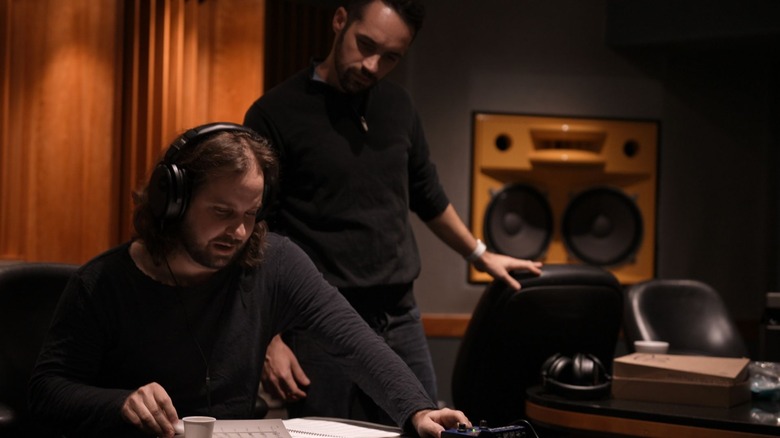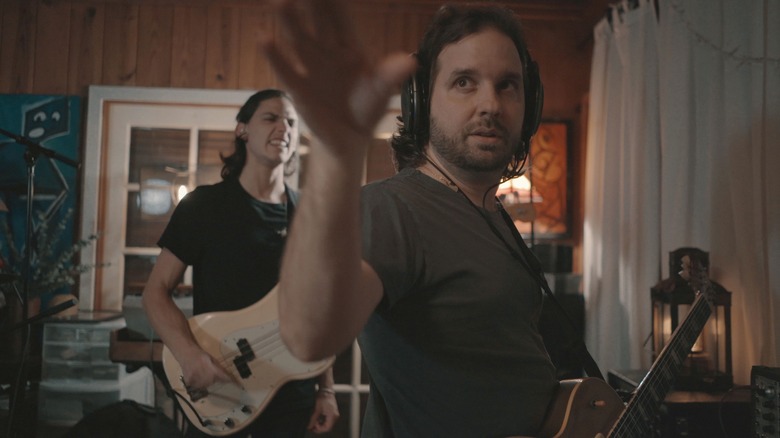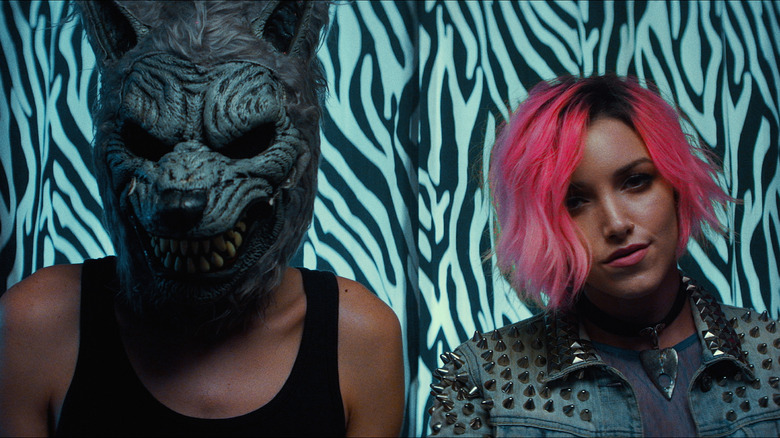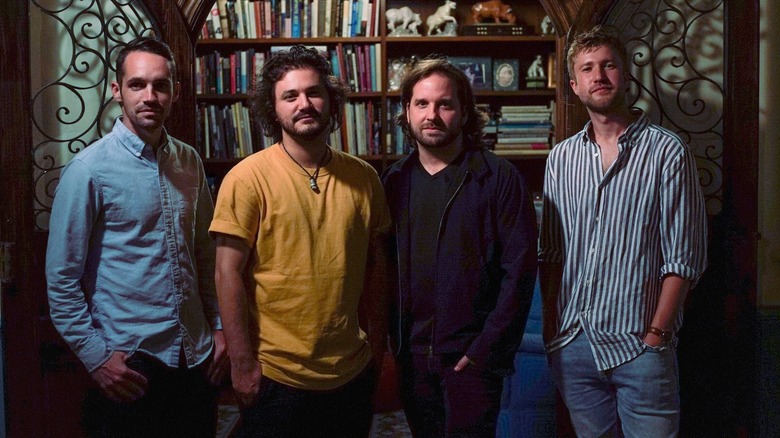Poser Composers Shawn Sutta And Adam Robl Threw A Funeral For A Fish [Interview]
"Poser" is about artists. It's set in the art scene of Columbus, Ohio, where a podcaster named Lennon (Sylvie Mix) becomes enchanted with the city's variety of talent. There's an eclectic soundtrack, but for the most part, it leans heavy on the local punk music. It's an aggressive sound that composers Shawn Sutta and Adam Robl contrast with more gentle, string-based music.
The composing duo have worked together for over 15 years, with their first collaboration happening when the duo was in college. They ultimately became co-composers in the world of film through a funny twist of fate, which they recently told us about in an interview about their work on Ori Segev and Noah Dixon's feature directorial debut, "Poser."
'We actually went to a church and played a big pipe organ and threw a proper funeral for this goldfish'
What do you have in your studio at the moment?
Sutta: We have a ATR-102 tape machine here. Little Eurorack modular synth. Original Mellotron, actually, down here. I don't know if you are familiar with Ondes Martenot?
I am not.
Sutta: Johnny Greenwood would use this synth controller that has a ring attached, and it has a theremin sound.
Robl: It allows you to slide instead of hit the notes.
Sutta: It's really cool. There's a bunch of other stuff in here too, like Benson microphones and guitar stuff.
Robl: We're actually doing a studio tour thing on June 15.
Sutta: I have my own writing room, and this is Adam's room.
For "Poser," there's a lot of punk songs in the movie, which you contrast with classical music. How'd that choice come about?
Robl: Contrast was the main intention, as you said, because there is so much band music and artists in indie music. We wanted the score to definitely stick out in a way that definitely contrasted that. It all started with a lot of classical temp, so we used that as a starting point. We wrote more classically driven pieces. And from there we started layering other sounds, like a female voice, which changed the whole thing just because our singer, Gabriela Ferrer, is incredible. She isn't really a classical trained vocalist. She has a more modern voice, so when we added her, it just took these classical-based driven pieces and it turned into something totally different, and it was really fun to do.
Why did you think classical-driven pieces were the best way to create that contrast, of all the sounds and genres you could've gone with?
Sutta: Yeah, we use classical music, I think, because of the way the main character is looking at all these indie musicians that are so young and cool, and obviously classical music really contrasts who they are. But it also gives this ironic elegance to the whole thing, where she's looking at these very modern young people. She's hearing this very stoic classical music that puts it into this whole other world, and shows you how much of a pedestal she puts them on.
Robl: It allowed us to almost exaggerate situations to fit her perception of everything. It elevated everything just as simple as her being asked to go upstairs to smoke weed, that's a prime example. It makes this moment just way, way more hyped. So we went in that direction of an elevated elegance to really heighten that moment.
The classical music makes it funnier, too.
Sutta: I think that the classical music definitely adds to the comedy of it. We're saying it juxtaposes so hard that it's pretty funny, and what you were talking about from the starting point, she's got all this energy for her new podcast. So the music reflects that, and it heightens the importance of it, like it is in her mind. "I'm starting this big endeavor and it's so elegant." And then as the movie progresses, the music follows the story, of course.
Robl: Yeah, everything starts unraveling and the facade is starting to get broken down. I think she's delusional to a certain degree.
Sutta: Another moment where I feel like the music adds to the comedy of the moment is the funeral for the fish that happens. We actually went to a church and played a big pipe organ and threw a proper funeral for this goldfish. And so, that was a place where we got to poke in and be funny.
Robl: It was quite a disclaimer to the violin player that came and performed it.
How were the acoustics in that church?
Sutta: Acoustics were awesome, so a big worship space, it's like a thousand seat facility and we put two microphones [in the] middle of the room and recorded the organ from there.
'It could almost sound hellish sometimes'
Did you go anywhere else, like the church, to compose some of the score?
Robl: Honestly, it was mostly recorded in this room, or in Shawn's room for the piano stuff.
Sutta: The score went down during the pandemic, too. It wasn't really the time to be going to other places. We did some stuff after the fact at Criteria Studios, which is a great studio in town, but we didn't really record anything in the bathroom or anything like that.
Robl: I don't think you want it. No, my bathroom doesn't sound very good. We were pretty limited when we were scoring. So it was basically just Shawn, me, and Gabriela Ferrer, the vocalist and –
Sutta: Abby Young on violin.
Robl: I played most of the strings that you're hearing. We don't use any fake strings or anything. I mean, that's always a rule and I'm not really a string player, but I try my best to make it sound good with studio magic and whatnot. But we hired one string player to record the fish flush queue, and it was a very in-house process.
I'm a guitar player and I play a little piano and I dabble in other little things, but like cello and violin were something I decided to learn just because we were so sick of hearing fake strings. When we have budgets to hire string sections, we're always going to do that, but in this situation because of Covid and because it's an indie film, we just made it work and it was fun. It's a fun challenge.
What's some of the studio magic you use to make your strings sound better?
Robl: Many takes, a lot of takes and gluing it together. Anytime Shawn always knows to leave the room when I'm about to record strings, because it could get very –
Sutta: It's not a pleasant performance.
Robl: It could almost sound hellish sometimes, which works great for horror films.
You play the strings for some horror towards the end, though, right?
Robl: We wanted to give it both an emotional aspect because of her performance, you're starting to realize how alone she is. There's a very human element to that. I mean, the horror element was maybe more directed towards the visuals that were happening in that moment, but we wanted to always get it to a point where it's still human. It's still something that people can relate to.
You used some analog synth, too. Is that right?
Robl: Yeah, there's the modular, which is just a collection of your Eurorack modular that are put together. We have the original Prophet-Five, and we have the original Moog Model D. And then just a bunch of weird effects with strings and things like that.
Sutta: Well, the Prophet-Five is always the base. It's always the...
Robl: When you want thick, rumbling.
Sutta: Prophet is when you want to play harmonies and you want to play more piano keyboard style. And then the Eurorack is really for chaos time.
Robl: You can go forever with that thing. It's endless, endless sounds.
Sutta: You can get things out of it that you wouldn't actually come up with yourself, but they come out and then you just recognize that might work.
Robl: It's just a lot of experimenting.
'Holy sh*t, Shawn's house'
How else did you experiment with the score for "Poser?"
Sutta: Well, one thing I would say about the writing process is that it's all discovery. You're just trying things out and you're digging through the sand and then suddenly you find a shell and you're like, "Oh, that's cool. Let's put that into the sand castle and just keep going from there." It all just seems like you're just grabbing things by accident and discovering them along the way.
Robl: Well, there were all sorts of situations, like we said earlier, a lot of the pieces might have been written on piano beforehand. A lot of the discovery might have happened after the fact when we were sitting with the piece, and just finding textures that made it feel different or made it feel more suitable to the scene. Shawn's right: A lot of times it's all discovery when you mix sound with picture. Everything changes. It changes everything.
In this instance, when do you know you are going to connect with filmmakers musically?
Sutta: This one was particularly amazing. We had a Zoom call. This was the early days of Zoom, too, like at the beginning of the pandemic, we're all just getting used to that platform. The four of us got on there and we hadn't even seen the cut yet. They shared during that call — we saw an early trailer, like, "Oh, that's a cool aesthetic."
Sutta: But the vibe with the four of us and the creative flow, there was just a great feeling there and an excitement to get the thing done that we knew right from the beginning that it was going to be a really fun ride.
Robl: I mean, it was before we even saw the film and we knew it was going to be a good time.
Sutta: They sent us a very solid work in progress that the story was there, they had already made a really great film, but they did disclaimer that a lot of scenes were going to change and things were going to get mixed around a lot.
How about you two? When did you realize you worked together well as composers?
Sutta: We actually met in college studying studio music and jazz performance. We got thrown into a situation where we were in this weird ensemble and had to come up with something. The two of us started throwing in ideas, and we're just having such a good time. It was our first collaboration, and we knew from then that we would work well together. We became real close friends in school and then accidentally, or just by chance, became neighbors after, where we just rented these houses that were right next to each other.
Robl: He was already renting the house behind this one, and I was looking to move into a house and I was with a couple friends and I was just checking this house out, walking. I knew it was close to him, but I wasn't sure how close, and I was walking through the backyard and I just was like, "Holy sh*t, Shawn's house." I called him up, I'm like, "Dude, walk in your backyard right now. I'm about to move in behind you." And that was a while — how long ago was that?
Sutta: That was like 12 years ago. We were doing a lot of performing and just out of college trying to figure out careers and how where we wanted to go with things. We were both already getting our personal studios together. In a conversation, we were just talking about how the ultimate thing for us had always been film. We'd always been such big fans of film music and films in general.
But we had no idea how to get into it, but I was like, "Let's just commit to it. Let's just do it." And we did, and as soon as we started writing together for the first little commercials and stuff that had come in, there was a really great sense of collaboration and we knew then it was going to work out.
How did you guys first get those opportunities for commercials?
Robl: You got lucky.
Sutta: Definitely some luck to it. Commercials were not the end goal, but it's tough when you have no credits and to get their first thing. What I just did is just started telling everybody, "This is what I'm doing now." The film composer with no experience at all.
Robl: And it was because of the commercials that we got our first feature. I'd say maybe a year and a half after we started, maybe two years, that feature ended up going to South by Southwest and getting distribution. It was called "Uncle John."
Sutta: We obviously just love writing to stories. We love working with these — I love collaborating with a lot of people, and film is the perfect platform for that, where you have these huge film teams. They let us command one of the ships, which is the music.
"Poser" is now playing in New York and Los Angeles and will expand to more theaters soon.



